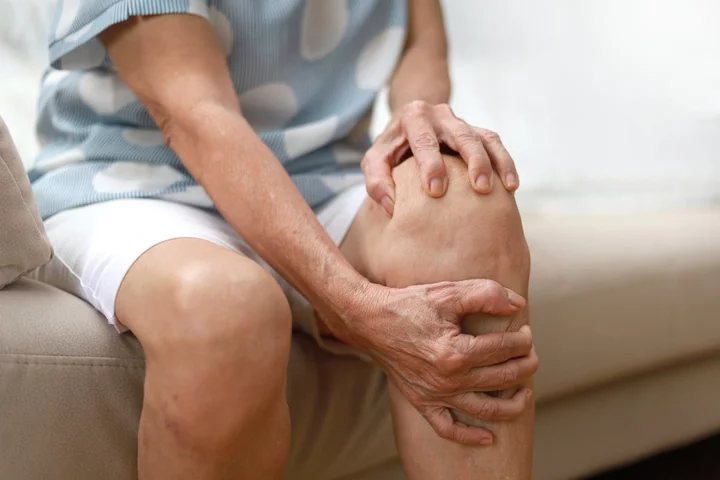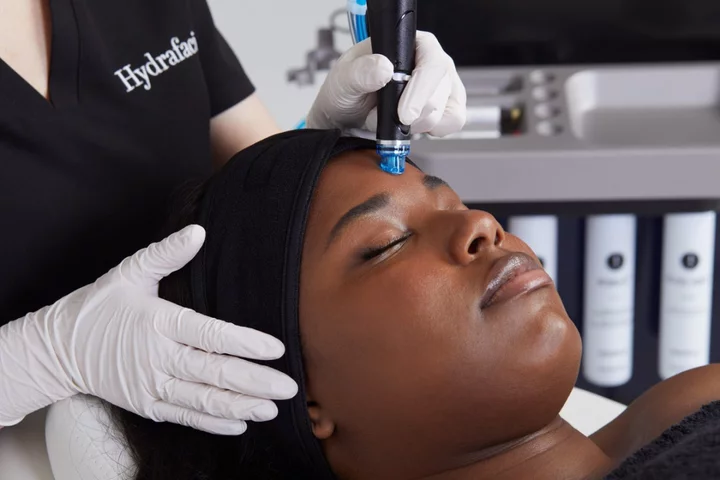
What is rheumatoid arthritis?
Waterloo Road star Adam Thomas has announced he has rheumatoid arthritis ahead of his Strictly Come Dancing debut next month. In an Instagram post shared on 11 August, the actor, 35, told his followers that he initially thought that the condition was something people were diagnosed with “later on in life”. “As much as I act like a kid, my body is telling another story…” he wrote. “I thought that was something people, later on in their life get… but that’s not the case, clearly!” “I’ve been in a lot of pain since January,” he continued. “It started with my knees and then travelled to my wrists, fingers and now ankles and toes.” Thomas explained: “I never knew what was happening and finally after several blood tests and back and forth to doctors and hospitals, I’ve been diagnosed with rheumatoid arthritis!” The actor, who is competing in this year’s instalment of Strictly Come Dancing but has said that he is “up for the challenge”. “It really couldn’t have come at a better time I’m a firm believer of everything happening for a reason, and I know the journey I’ve been on was meant to happen, to never take small things in life for granted!” he assured fans. “…Like going for a run, playing with my kids and just being able to walk with no pain!” “I know it’s going to be tough and I’ve definitely got my work cut out but am up for the challenge and can not wait to get on that dance floor!!” What is rheumatoid arthritis? Rheumatoid arthritis is an autoimmune disease and long-term condition that typically affects the hands, feet and wrists. Benjamin Ellis, a Consultant Rheumatologist and Senior Clinical Policy Advisor to Versus Arthritis (the UK’s largest arthritis charity), told The Independent: “Rheumatoid arthritis affects people of all ages, and happens when the immune system – the body’s natural defence system – goes out of balance and attacks the joints making them inflamed, swollen and painful.” Some people with rheumatoid arthritis also experience problems in other parts of the body, or more general symptoms such as tiredness and weight loss. According to the NHS, the condition often starts when a person is between 30 and 50, and women are more likely to be affected than men. What causes rheumatoid arthritis? The NHS states that it is not clear what triggers this problem with the immune system, but women, people who smoke, and people who have a family history of rheumatoid arthritis are at increased risk. Depending on how much pain a person experiences, their daily tasks can become difficult and take longer to do. Is there a cure for rheumatoid arthritis? There is no cure for rheumatoid arthritis but an early diagnosis and treatment allows people with the condition to have long periods between flare-ups. The NHS states that the main treatment options include taking medicine to relieve symptoms, supportive treatments like physiotherapy and surgery to correct any joint problems. Ellis told The Independent that early treatment can reduce the risk of long-term joint damage. “Urgent and intensive treatments to rebalance the immune system improve symptoms and reduce the risk of long-term, disabling joint damage caused by this inflammation, but NHS delays mean that not everyone is getting the treatment they need, as quickly as they need it,” said Ellis. “Keeping moving is great for the joints, whatever type of arthritis you have. The best thing is to pick something you enjoy, and listen to your body to do the right amount that works for you, whether that’s walking, yoga, swimming or dancing.” What are the complications of rheumatoid arthritis? Having rheumatoid arthritis can sometimes lead to other conditions like carpal tunnel syndrome or inflammation of other areas of the body, causing additional symptoms. The NHS states that some complications can be more serious, like an increased risk of heart attack and stroke. But it advises that managing the condition early on can help to reduce the risk of complications. You can find out more about living with Rheumatoid arthritis on the NHS website here. For further support and information about arthritis, visit www.versusarthritis.org or call the free Versus Arthritis helpline on 0800 5200 520 . Read More Adam Thomas diagnosed with long-term health condition ahead of Strictly Come Dancing Husband ‘ruins’ dinner because of his wife’s typo: ‘The worst kind of control freak’ Fan who went into labour at Pink concert names newborn son after her Adam Thomas diagnosed with long-term health condition ahead of Strictly Come Dancing From Angela Scanlon to Zara McDermott: The fashion of this year’s Strictly contestants Linda Evangelista opens up about co-parenting with son’s stepmother Salma Hayek
1970-01-01 08:00

Adam Thomas diagnosed with long-term health condition ahead of Strictly Come Dancing
Actor Adam Thomas has revealed he has been diagnosed with a long-term health condition just days after being announced as the eighth celebrity contestant who will compete in the forthcoming series of Strictly Come Dancing. Sharing a post to Instagram on Friday (11 August) to celebrate his 35 birthday, the Waterloo Road actor told his followers that he has been diagnosed with rheumatoid arthritis. “As much as I act like a kid, my body is telling another story…” he wrote. “I’ve been in a lot of pain since January,” he continued. “It started with my knees and then travelled to my wrists, fingers and now ankles and toes.” Thomas explained: “I never knew what was happening and finally after several blood tests and back and forth to doctors and hospitals, I’ve been diagnosed with rheumatoid Arthritis!” The actor, who is best known for playing Donte Charles in BBC school-based drama, said that he originally thought arthritis was something that people are diagnosed with “later on in life”. Last week, Thomas was announced as the eighth celebrity contestant to appear on Strictly Come Dancing, but has said that he is “up for the challenge”. “The reason I signed up to Strictly is because I just want to be able to move again, get fit and do it, all with a smile on my face!” he wrote. “It really couldn’t have come at a better time I’m a firm believer of everything happening for a reason, and I know the journey I’ve been on was meant to happen, to never take small things in life for granted! …Like going for a run, playing with my kids and just being able to walk with no pain!” “I know it’s going to be tough and I’ve definitely got my work cut out but am up for the challenge and can not wait to get on that dance floor!!” Thomas, who marked his birthday by sharing a picture with his wife, Caroline Daly and their two children, told his followers to “stay positive” and “get the right help where and when you can”. Rheumatoid arthritis is an autoimmune disease and long-term condition that causes pain, swelling and stiffness in the joints. The condition usually affects the hands, feet and wrists and can cause flare-up periods, where symptoms become worse for a period of time. According to the NHS, the condition often stars when a person is between 30 and 50 years old, and women are more likely to be affected than men. Thomas played Adam Barton in ITV soap Emmerdale and also appeared in I’m a Celebrity... Get Me Out of Here in 2016, and went on to co-host the spin-off I’m a Celebrity: Extra Camp. Speaking in a statement ahead of his Strictly debut, Thomas said he has been a fan of the dance competition “for years”. “I can’t believe I’m actually doing it!” he said. “I can’t dance to save my life but I’m buzzing to learn and have a good laugh with my pro. Get me on that dance floor... I can’t wait!" Former Strictly contestants have been sharing their words of encouragement for Thomas as he embarks on the challenging training schedule. “You’re so strong and with your family behind you, you can conquer anything. Can’t wait to see you smash it on Strictly ,” wrote singer and presenter Fleur East, who competed in last year’s competition. TV presenter Angela Scanlon, who will be competing alongside Thomas this year, wrote: “You’ve got this.” Find the full Strictly Come Dancing 2023 lineup here. Read More Husband ‘ruins’ dinner because of his wife’s typo: ‘The worst kind of control freak’ Fan who went into labour at Pink concert names newborn son after her From Angela Scanlon to Zara McDermott: The fashion of this year’s Strictly contestants Linda Evangelista opens up about co-parenting with son’s stepmother Salma Hayek Katharine McPhee reveals she and David Foster suffered a ‘family tragedy’
1970-01-01 08:00

They sold their home to open a clinic in rural Vermont. Eight months later, the floods came
Geoff Butler jumped into his truck in the dark hours of July 11 as heavy rain battered the rural Vermont town of Johnson.
1970-01-01 08:00

Malaysia’s Good Vibes Festival seeking 2m in damages from The 1975
Malaysia’s Good Vibes Festival is seeking over $2 million in damages from the 1975, after frontman Matty Healy’s on-stage protest against the country’s anti-LGBTQ laws.
1970-01-01 08:00

Linda Evangelista makes rare comment about co-parenting with son’s stepmother Salma Hayek
Linda Evangelista has made a rare comment about co-parenting with her son Augustin’s stepmother, Salma Hayek. The 58-year-old model spoke candidly about her relationship with her ex, François-Henri Pinault, and his wife, Hayek, during a recent interview with Vogue while appearing on the cover of the magazine’s September issue. She revealed that, during the holidays, her 16-year-old son is usually with his father and stepmother, who share a 15-year-old daughter, Valentina. However, according to Evangelista, there was one holiday celebration where she hadn’t felt well, so Hayek stepped in to take care of her. “I was sick at Thanksgiving,” she explained. “And Salma got on the plane with her daughter, came here, and made Thanksgiving dinner. She asked what I wanted - it was a very eclectic wish list.” She continued: “I wanted her Mexican chicken with truffled potatoes. And she spent the day in the kitchen and cooked it herself. No help. The kids helped her at the end.” She went on to praise Hayek for quickly coming to her aid immediately after she’d said that she was sick. “She made a feast - a beautiful, beautiful meal. I had told her that I wasn’t going to have Thanksgiving; I wasn’t feeling well. And she said: ‘Oh yes you are: I am coming.’ And poof, she was here,’” the model added. In 2011, Evangelista filed court papers to seek child support from Pinault, with the document revealing that he was the father of her son. While the pair had dated for three to four months in 2006, Pinault said that he’d only spent about seven days total with the model. They settled the child support case in 2012. It appears that Evangelista’s son and Hayek have gotten close over the years. In 2021, Hayek took to Instagram to share a rare snap of her and Augustin on a boat during what appeared to be a family vacation. Augustin also made his red carpet debut in April, alongside Hayek and Valentina, as they attended the Time 100 Gala together. Elsewhere in her interview with Vogue, Evangelista opened up about raising her son while in the spotlight. She recalled how, during the early days of her career, Madison Square Garden would call and offer her courtside seats to Knicks games, which she’d go to with her son. However, according to Evangelista, now that those calls have “stopped,” she and her son buy the tickets themselves. “Out of sight, out of mind. Now we buy our tickets and we sit with the fans in nosebleed - we’re fine with that. I wanted to have a very normal upbringing for my child,” she said. Evangelista also said that her son has questioned the benefits of fame, as he’s asked: “Do you think if they recognised you we would have to be standing in this line?” However, she said that she doesn’t hesitate to counter the question, before explaining that she doesn’t want her child to grow up being “entitled”. “What’s wrong with standing in this line? I stand in lines,” she said. “We went to Chanel a couple of weeks ago to get a present and we waited half an hour to get in. He said: ‘Isn’t there someone you could call?’ I do not want an entitled child.” Read More Salma Hayek admits fears over Black Mirror role: ‘Do I really want to do this? Am I going to get in trouble?’ Salma Hayek opens up about embracing her ‘whites hairs and wrinkles’ as she shares new selfie ‘I’m here anyway, why not?’: My non-surgical facelift has got me thinking about more procedures Katharine McPhee reveals she and David Foster suffered a ‘family tragedy’ Gemma Atkinson slams trolls who called her ‘fat’ just three weeks after giving birth Mother diagnosed with cystic fibrosis, anorexia and incurable cancer
1970-01-01 08:00

Katharine McPhee reveals she and husband David Foster suffered a ‘horrible family tragedy’
Katharine McPhee has revealed that she and husband David Foster have suffered a “horrible family tragedy”. The singer, 39, shared a statement to Instagram on 11 August to announce that she’ll be missing the rest of her husband’s tour in Asia, where she’s been performing as a guest, due to a family emergency. Although she didn’t specify what the tragedy was, she wrote that she’ll be heading home to be with her loved ones, while implying that her husband will still be doing the shows this weekend. “Dearest Jakarta fans, it’s with heavy heart I announce I have to miss our final two shows of our Asian run,” she wrote. “David and I have had a horrible tragedy in our family and at least one of us needs to get back home to our family.” She concluded: “Please know how sorry I am and how much I wish to return someday and perform for you all. Love, Katharine.” Many friends and fans of the couple took to the comments of McPhee’s post to send her kind messages amid the family tragedy. “Sending my love and prayers for your family,” Masked Singer judge Nicole Scherzinger wrote, while Linda Thompson added: “Sending you and David love, & hoping that everything is okay.” “Sending you loads of love. I’m thinking of you guys,” Amanda Kloots also wrote. Foster, 73, is still set to play at the Sentul International Convention Centre in Jakarta, Indonesia, on 11 August and 12 August, according to his official website. He will then be on a hiatus from his tour, before returning to the stage on 1 November in Warren, Michigan. The Independent has contacted a representative for McPhee and Foster for comment. Foster and McPhee made their official debut as a couple in 2018, before officially tying the knot the next year. They welcomed their first child, Rennie, in February 2021. Since then, they have continued to post about their son on social media, hinting that he also has a musical side. In June, Foster shared a video on Instagram of Rennie playing the drums, alongside the caption: “PROGRESS!! Two years three months.” During an interview with Entertainment Tonight in October, Foster acknowledged that although his youngest child has developed an interest in drumming, it’s still soon to tell if he’ll become a musician like his parents. “You know when you look at somebody like Andre Agassi and Steffi Graf, their kids are very talented... but they’re not tennis players, so we don’t know,” he said “He’s so young.” McPhee also agreed, adding: “It makes sense that he’d be musical, but we’re not really sure. He’s certainly obsessed with the drums! Or imaginary drums, for that matter.” Read More Katharine McPhee reveals whether she and David Foster want more children David Foster opens up about raising a toddler at age 73 Katharine McPhee defends husband David Foster after backlash over postpartum body comment Gemma Atkinson slams trolls who called her ‘fat’ just three weeks after giving birth Mother diagnosed with cystic fibrosis, anorexia and incurable cancer 7 ways for parents and carers to ease back-to-school worries
1970-01-01 08:00

Mother diagnosed with cystic fibrosis, anorexia and incurable cancer says she ‘doesn’t feel afraid of dying any more’
A mother who was diagnosed with cystic fibrosis (CF) just days before her 30th birthday and later told she has myeloma – an incurable type of blood cancer – said she has “taught (herself) a whole new script for death” and, rather than feeling afraid, she feels “empowered” by what she has overcome. Ellie Allman, 42, who lives in Hadleigh, Suffolk, with her husband Steve, 44, a charity consultant, and son Harvey, 13, used to work as a specialist adviser for vulnerable young people but she had to retire, aged 35, after being diagnosed with CF aged 29. CF is an inherited condition that causes sticky mucus to build up in the lungs and digestive system, and while Ellie did not “feel anything initially” when she received her diagnosis, she “struggled mentally” later on and ended up developing anorexia, as she felt she had “no control over anything”. “I was off work, I was frustrated, I was angry, my body didn’t feel right CF-wise – I had no energy, I couldn’t do what I wanted,” Ellie told PA Real Life. “I was spending my days weighing everything I ate and just constantly doing the maths. “It seems ridiculous now, but it made so much sense at the time to that very determined person who was just clinging on to any form of normal life.” After becoming eligible to take Kaftrio in June 2021, a medication which significantly improves lung function, she noticed a vast improvement in her health. However, in less than a year, Ellie “randomly” became very unwell, and this led to the devastating news she has incurable cancer. After this, she underwent four months of chemotherapy alongside immunotherapy, followed by a stem cell transplant to replace the damaged blood cells with healthy ones in March 2023, and then a further two months of consolidation chemotherapy which included immunotherapy. She lost her hair, felt “exhausted” and anxious, and experienced pain “worse than labour contractions” from the “harvest of (her) stem cells” before the transplant, but she knew the pain would not last forever – and she said the support she has received from her husband, son, doctors, consultants and the charity, Ending Life’s Taboo, has been invaluable. She is now in remission and undergoing maintenance chemotherapy, and while she has experienced feelings of anger and resentment, she knows she can handle anything that her health throws at her. “I’ve taught myself a whole new script for death; I find it difficult to live with failing health, but I don’t feel afraid of dying any more,” she said. “We don’t get a choice, that’s just how it goes, but I think having the right people around you is so important. “I think it’s really natural when you’re young, or when you’re scared, to unintentionally isolate yourself or become withdrawn, and that has never ever worked for me. “I have to work hard not to lose myself within these diagnoses, and I have to remind myself that I’m still the person I was before my diagnosis.” During her childhood, Ellie developed whooping cough “in succession” – a bacterial infection of the lungs and breathing tubes – along with other chest infections and bouts of flu, but she was otherwise fit and healthy and used to run, swim, and was even a sports captain at school. She remembers certain periods of her life where she felt extremely fatigued and achy, but since her mother preferred alternative and natural medicines, Ellie rarely visited the doctor – and given she had “coughed (her) entire life”, she was “dismissive” of her symptoms. Later on, during her pregnancy, Ellie developed repeated chest infections, experienced difficulties with her speech, and could not clear her throat, but it was not until after she gave birth to her son Harvey, now 13, in 2010 that she underwent further testing. In February 2011, just days before her 30th birthday, it was confirmed she has cystic fibrosis – and, at first, she said she was “not willing to make room for CF in (her) life”. “You’ve lived your whole life not ill and then suddenly there’s this label,” Ellie said. “I didn’t feel anything initially, but I struggled with it later on, mentally.” According to the charity Cystic Fibrosis Trust, CF can be diagnosed during a new-born screening, which is carried out as part of the heel-prick test that all babies in the UK receive, but since this was only introduced nationally in 2007, this was not available for Ellie. Moreover, Ellie’s rare genotype made her CF even more difficult to diagnose. She underwent treatment in the form of intravenous (IV) antibiotics and physiotherapy sessions and noticed an improvement in her health, but when she started experiencing difficulties with her digestion – caused by a build-up of thick mucus – she started to feel “really frustrated with the world”. The side effects of the prescribed drugs also meant she could not conceive again – and while she is extremely grateful for her family, this had a “massive” impact on Ellie at the time. Ellie was then told she needed to take the medication Creon with food, which aids digestion, except for with fruits and vegetables, and this led to her developing anorexia in 2016. She said her head would “scream at her” but she could not “free (herself)” from negative thoughts that would body-shame her. “I had no control over anything, it was the perfect storm in a way; the perfect circumstances for me to use that as a control mechanism,” she said. Ellie became very weak after her “dramatic weight loss” of more than four-and-a-half stone, but after realising she needed to prioritise her health and time with her family, she underwent treatment and therapy to “reframe” her negative thoughts, so they were no longer a “dominant” force in her life. In June 2021, Ellie started taking Kaftrio, and she described it as “a miracle drug”, but approximately 11 months later, she began experiencing a “burning pain in (her) chest”. This led to the heart-breaking news in July 2022 that she has myeloma – a type of blood cancer, which is incurable – and the pain caused by treatments was unimaginable at times. She said: “Since Kaftrio thins the mucus, the high-dose chemo just ripped through the mucus in my throat, so I couldn’t swallow; the pain was insane. “My throat was blistered and ulcerated, so I couldn’t eat and I was put on to a feeding tube. “But I knew I had to get through it because if I stay in remission for two years, I could have a second transplant in future.” Ellie is now in remission and is undergoing maintenance chemotherapy, which she said “feels like a breeze in comparison”, and she is continuing to take Kaftrio, meaning the symptoms of her CF have “massively reduced” and she can enjoy the “simple things in life again”. She likes going on dog walks, meeting friends for a drink, and spending time with her “favourite people”, as that “makes everything else feel better” – and looking back now, she feels “empowered” that she has handled her CF, anorexia, cancer diagnosis, and treatments. While myeloma is incurable and Ellie has had some “existential thoughts”, she said processing what may happen in life has been “freeing” and she has always held on to hope. She has applied to become a magistrate and hopes another “miracle drug” like Kaftrio may become available during her lifetime to treat the cancer. She added: “Even in the most testing of times, every time I have found something positive to focus on or something to hope for and that has kept me going.” Ellie’s cancer is not linked to CF. To find out more information, visit: www.cysticfibrosis.org.uk/what-is-cystic-fibrosis/how-does-cystic-fibrosis-affect-the-body/cystic-fibrosis-complications/cancer Read More Dancer who has Tourette’s tics says Lewis Capaldi’s Glastonbury performance left her ‘speechless’ ‘Long Covid has taken away my ability to eat food or urinate - I don’t recognise myself anymore’ How to lower your blood sugar levels, as new research reveals heart disease link Groundbreaking cystic fibrosis drug made seven-year-old girl feel better ‘within hours’
1970-01-01 08:00

7 ways for parents and carers to ease back-to-school worries
School should be the best years of children’s lives – but, as the new term approaches, evidence suggests it’s actually the most worrying time for many kids. The children’s helpline Childline delivered 7,772 counselling sessions about school/education worries last year, with a big increase in calls in the run-up to the start of the new school year. “School is a huge part of a child’s life, so it’s important they feel happy and secure there,” says Childline director Shaun Friel. “We know some children can feel anxious and apprehensive about going back to school, particularly after spending a lot of time away from the classroom due to the summer break. “In fact, our Childline counsellors see a spike in the number of counselling sessions they deliver to children about school worries following the summer holiday season.” Friel says some children feel worried about making friends, getting lost, or the workload at a new school, while others may have concerns about returning to their current school due to friendship issues, fears about upcoming exams, or the recurrence of bullying. “However a child feels about returning to school, we want to remind them that these worries are normal and they aren’t alone,” he stresses. “If any child is feeling apprehensive about going back to school, our trained counsellors are here 24/7 over the phone and online.” As well as counselling, Friel says there are many things both parents and children can do to ease back-to-school anxieties. They include… 1. Writing feelings down Parents can get their child to write down everything they’re looking forward to at school, and everything they’re worried about. “Encourage them to show you the list so you can chat through their concerns, help them cope with their worries and also look at the positives,” suggests Friel. 2. Listening to their concerns If your child has concerns about going back to school, take time to listen to what they’re saying before you jump in to give advice or your opinion, Friel advises: “You could try repeating back what they’ve shared to check you’ve understood their feelings correctly – this will help them to feel really heard.” 3. Discussing practical solutions Once your child has shared any concerns or anxieties about going back to school, you could try talking through some practical solutions, suggest Friel. So, for example, if they’re worried about the amount of homework they’ll have, you could discuss how to break this down each evening and what they could do if they start to feel overwhelmed, like talking to their teacher or you. “You could start by asking them what they think might help them feel better about the situations that worry them,” says Friel. “This can encourage them to learn to think for themselves and feel in more control of the situation.” 4. Reminding them to take their time Remind your child it can take time to adjust to being back at school, and it’s okay if it doesn’t feel comfortable at first, says Friel. “Being back at school will mean a totally different routine, and it’s important to remember that this can take some getting used to,” he stresses. 5. Doing things they enjoy When kids are back at school, making time every day to do something they enjoy can really help to ease anxiety, says Friel. “Whether it’s time in their evening with friends, reading a book or hanging out with their siblings, it’s important to take time out,” he advises. 6. Talking to a trusted adult It’s important children are aware they can and should talk to a safe adult – perhaps a parent, carer, teacher, sibling over the age of 18 or a Childline counsellor – about anything. “No matter what the reason, if a young person is struggling ahead of going back to school, it’s vital they’re encouraged to talk to a safe adult about it,” stresses Friel. “Sharing their feelings with someone they trust will help them feel less alone with their worries, and that adult will be able to support them with this moving forward.” 7. Distracting themselves If children or young people make an effort to keep busy doing something they enjoy, such as playing football or listening to music, this could distract them from their worries, at least for a little while, says Friel. Staying connected with friends and family, whether that be online or in person, or doing some physical activity like going for a walk or taking part in a sport, can also be a good distraction technique. Young people can contact Childline, which is run by the NSPCC and supported by the People’s Postcode Lottery, on 0800 1111 or via 1-2-1 chat on Childline.org.uk Read More How to save money on your summer barbecue – as prices jump up from last year How to pick the best facial according to your age range What is the ‘carnivore diet’ trend and is it actually good for you?
1970-01-01 08:00

How to pick the best facial according to your age range
If you’re a dedicated skincare junkie, you might be thinking about how you can get that glow beyond your night-time skincare routine. Facials can be an appealing way of targeting any concerns you might have and giving your skin a bit of professional care. But they’re undoubtedly expensive, and generally more of an investment than buying a pot of moisturiser. Naturally, you want to spend your money as wisely as possible – and if you do have the extra funds for a facial, you don’t want to waste it. So, what’s the best type of facial to get for your age group? In your twenties “Facials and skincare choices in your twenties should be preventative; aiming to optimise your skin’s health and supercharging collagen and elastin levels,” says Dr Thuha Jabbar, aesthetic doctor and founder of Almas Dental. “Hydrafacials are a great, non-invasive skin boosting treatment that deep cleanse the skin, brighten and reduce fine lines. Chemical peels and other non-invasive facial treatments are also great to improve skin tone and keep breakouts at bay.” Dr Sophie Shotter is also a fan of Hydrafacials (which start from £125 depending on clinic and location – available in over 1,300 UK and Ireland providers). They provide a deep clean, followed by extracting any impurities then moisturising the skin. Shotter says they can “help to give the skin a deep clean, minimising the risk of breakouts. LED [light therapy facials] is also an excellent choice. Many facialists will combine techniques for best results.” Dr Radmila Lukian, dermatologist at the Lucia Clinic, recommends microdermabrasion for people in their twenties – a process where fine crystals and a vacuum are used to remove dead skin cells. She says it’s “a great treatment for brightening dull skin and reducing pigmentation. Perfect for young adults.” In your thirties When you hit your thirties, this is the time when Shotter recommends “starting to think about upping the ante” with your skincare. She recommends facials which incorporate microneedling – a process where small needles pierce the top layer of your skin. “We often start to notice the early signs of ageing, as collagen loss kicks in through our thirties, and these treatments can help to stimulate collagen production leading to significant improvements in skin texture,” Shotter says. Lukian recommends a facial that incorporates dermaplaning – where a scalpel removes hair and dead layers of skin – which she says can help “combat free radical damage, stimulate collagen and improve skin texture”. In your forties When you reach your 40s, Lukian suggests LED light therapy and laser skin resurfacing treatments, as they “become more relevant to target wrinkles, stimulate collagen and improve skin elasticity”. She adds: “Laser skin resurfacing uses targeted laser energy to promote collagen production – revealing healthier, younger-looking skin.” Kim Kardashian, 42, is a fan of laser facials, and often posts about her treatments on Instagram. Jabbar adds: “Your forties are a great time to try laser treatments, to reduce the visibility of wrinkles and boost the overall health and appearance of your skin. From laser skin resurfacing treatments to IPL [intense pulsed light] facials that reduce hyperpigmentation and sun spots, lasers are a versatile and non-invasive option which can restore a youthful glow to your skin.” In your fifties and beyond “In your fifties and beyond, keeping focused on collagen stimulation with similar approaches to our forties certainly helps a lot,” says Shotter. “But in our fifties, we often start to notice many more visible signs of ageing, including pigmentation and skin wrinkling (elastosis). Using deeper chemical peels or resurfacing laser techniques, which may carry a little downtime, but are worthwhile for the results.” For this age range, she says skin hydration “is also often a higher concern than in younger years”, so hydrating facials are an excellent choice too. While Hydrafacials are great in your twenties, they’re equally beneficial in your fifties and beyond – singer and actor Jennifer Lopez, 54, recently collaborated with the brand for her own ‘JLo Beauty Booster’ that can come as part of the treatment. Read More Charity boss speaks out over ‘traumatic’ encounter with royal aide Ukraine war’s heaviest fight rages in east - follow live What is the TikTok ‘carnivore diet’ trend and is it actually good for you? How to save money on your summer barbecue as prices soar Exercise and yoga can help improve lung function in adults with asthma – study
1970-01-01 08:00

What is the TikTok ‘carnivore diet’ trend and is it actually good for you?
When it comes to weird diets, TikTok is pretty notorious for spreading the word about them – and the latest iteration, the carnivore diet, is no different. The carnivore diet tag on the video-sharing platform has over a billion views, with followers of the diet dedicating themselves to meals consisting of a lot of meat (both cooked and raw), eggs and lumps of butter. With some content creators reporting immense fat loss and improved general wellbeing, how healthy is the carnivore diet? The pros “The carnivore diet, also known as the all-meat diet or zero-carb diet, is a dietary approach that involves consuming only animal products and excludes all plant-based foods,” says Dr Simon Theobalds, GP at Pall Mall Medical. Comparable to the no-carb, protein-heavy keto diet, it has the potential to boost some much-needed macronutrients, vitamins and minerals in your diet. “Red meat is a rich source of complete protein, providing all the essential amino acids the body needs for various functions, including building and repairing tissues,” says Theobalds. It can also boost iron levels: “Red meat is one of the best dietary sources of heme iron, which is more easily absorbed by the body compared to non-heme iron found in plant-based foods,” he says. “Iron is essential for transporting oxygen in the blood and supporting energy metabolism. “Red meat is also an excellent source of vitamin B12, a nutrient mainly found in animal products. Vitamin B12 is essential for nerve function, DNA synthesis, and the formation of red blood cells.” And it’s a good source of zinc, a mineral Theobalds says plays a vital role in immune function, wound healing, and cellular growth and repair.The cons So far, so good. But, where does it start to be damaging? “Red meat, particularly fatty cuts, can be high in saturated fat and cholesterol,” says Theobalds. “Consuming large amounts of saturated fat and cholesterol has been associated with an increased risk of heart disease and stroke.” Similarly, processed meats, such as bacon, sausages, hot dogs, and deli meats, have been classified as Group 1 carcinogens by the International Agency for Research on Cancer (IARC). “This means there is strong evidence linking processed meat consumption to an increased risk of cancer,” he adds. It could also mean when you get sick, it’s harder to get well again, as it may encourage antibiotic resistance. “In many countries, livestock may be treated with antibiotics to promote growth or prevent disease,” Theobalds notes. “The overuse of antibiotics in meat production can contribute to antibiotic resistance, making it harder to treat bacterial infections in humans.” Despite the nutrients you can get from animal products, this diet could still lead to certain deficiencies. “Meat lacks essential nutrients found in plant-based foods, such as dietary fibre, certain vitamins like vitamin C, and minerals such as potassium. Long-term consumption of only meat can lead to nutrient deficiencies and related health problems,” he adds. A varied diet will also promote a healthier gut. “Aiming to incorporate 30 different plants into your diet each week is a great goal to have in mind,” says Anna Tebbs, registered nutritionist and head chef at Green Chef. “Having a range of plants in your diet will ensure you are fuelling the different gut microbiomes in your body. A plant-based diet tends to be higher in prebiotics, which gives the good bacteria in your gut extra fuel, and has an anti-inflammatory effect.” Is it worth it? With so many people posting about and adopting this diet, is it worth the risks for the benefits it promises? “While consuming meat can provide important nutrients, relying solely on a diet of meat and excluding other food groups may pose several risks,” says Theobalds. “A balanced diet provides essential nutrients, supports overall health, and reduces the risk of nutritional deficiencies and associated health problems. Before making any significant dietary changes, especially one as restrictive as an all-meat diet, it’s essential to consult with a registered dietitian or healthcare professional. They can help assess your nutritional needs, provide personalised guidance, and help you develop a balanced and sustainable eating plan that aligns with your health goals. Read More Charity boss speaks out over ‘traumatic’ encounter with royal aide Ukraine war’s heaviest fight rages in east - follow live How to save money on your summer barbecue as prices soar Exercise and yoga can help improve lung function in adults with asthma – study 7 ways to ease back-to-school worries
1970-01-01 08:00

Exercise and yoga can help improve lung function in adults with asthma – study
Yoga and breathing control, in combination with aerobic training, can help improve lung function in adults with asthma, a new study suggests. The findings highlight the importance of integrating appropriate exercise training into asthma management plans, researchers say. The study indicates how specific types of exercise training can be effective in enhancing lung function for adults with the condition. Lead author Shuangtao Xing, an associate professor at the School of Physical Education at Henan Normal University in China, said: “Breathing training combined with aerobic training, and yoga training, appear to be particularly advantageous – offering potential avenues for effective treatment approaches. These findings should provide valuable insight for healthcare professionals prescribing exercise training for the management of adult asthma patients Shuangtao Xing, Henan Normal University “Larger, well-designed randomised controlled trials are now needed to more accurately estimate the benefits of exercise training for individuals with asthma. “These findings should provide valuable insight for healthcare professionals prescribing exercise training for the management of adult asthma patients. “However, it is essential to consider individual factors, such as family history, duration of the condition, and environmental influences, when designing exercise rehabilitation programmes. “Tailoring interventions to individual physical and mental health conditions, with careful consideration of exercise intensity, frequency and duration, is important for optimising treatment outcomes.” Asthma is a chronic lung condition that affects around 339 million people worldwide, causing symptoms such as coughing, wheezing, shortness of breath and chest tightness. The National Institute for Health and Care Excellence (Nice) states that in the UK, more than eight million people, or approximately 12% of the population, have been diagnosed with asthma. However, some may have grown out of the condition, and around 5.4 million people are receiving asthma treatment. In the past, exercise was considered a potential risk factor for people with the condition, as it was believed to trigger or worsen acute asthma attacks. However, recent studies have revealed that exercise training can actually enhance lung function and exercise capacity in adult patients. To address challenges posed by variations in the specific exercises featured in research, researchers compared results from multiple treatments across 28 studies, including 2,155 patients. They examined the effects of breathing training, aerobic training – which increases the rate at which oxygen inhaled is passed on from the lungs and heart to the bloodstream – relaxation training, yoga training, and breathing combined with aerobic training, on lung function. All five types of exercise demonstrated greater effectiveness in improving lung function, the study found. Specifically, the researchers found that breathing training, aerobic training, relaxation training, yoga training, and breathing combined with aerobic training, led to improvements in the amount of air that a person could force out of their lungs in one second (FEV1), and the levels of air flowing out of the lungs (PEF). Aerobic training, breathing training, yoga training and breathing combined with aerobic training, improved the level of the amount of air that could be forcibly exhaled from the lungs after the deepest breath possible was taken (FVC). Breathing training, aerobic training and yoga training improved the FEV1/FVC ratio, the study published in the Annals of Medicine journal found. The researchers highlight that the majority of patients in the study were under 60 years of age, so exercise interventions may yield different responses in older people. Read More Charity boss speaks out over ‘traumatic’ encounter with royal aide Ukraine war’s heaviest fight rages in east - follow live 7 ways to ease back-to-school worries What is the best type of facial for your age range? King Charles reshuffles military roles with new duties for William and Kate
1970-01-01 08:00

7 ways to ease back-to-school worries
School should be the best years of children’s lives – but, as the new term approaches, evidence suggests it’s actually the most worrying time for many kids. The children’s helpline Childline delivered 7,772 counselling sessions about school/education worries last year, with a big increase in calls in the run-up to the start of the new school year. “School is a huge part of a child’s life, so it’s important they feel happy and secure there,” says Childline director Shaun Friel. “We know some children can feel anxious and apprehensive about going back to school, particularly after spending a lot of time away from the classroom due to the summer break. “In fact, our Childline counsellors see a spike in the number of counselling sessions they deliver to children about school worries following the summer holiday season.” Friel says some children feel worried about making friends, getting lost, or the workload at a new school, while others may have concerns about returning to their current school due to friendship issues, fears about upcoming exams, or the recurrence of bullying. “However a child feels about returning to school, we want to remind them that these worries are normal and they aren’t alone,” he stresses. “If any child is feeling apprehensive about going back to school, our trained counsellors are here 24/7 over the phone and online.” As well as counselling, Friel says there are many things both parents and children can do to ease back-to-school anxieties. They include… 1. Writing feelings down Parents can get their child to write down everything they’re looking forward to at school, and everything they’re worried about. “Encourage them to show you the list so you can chat through their concerns, help them cope with their worries and also look at the positives,” suggests Friel. 2. Listening to their concerns If your child has concerns about going back to school, take time to listen to what they’re saying before you jump in to give advice or your opinion, Friel advises: “You could try repeating back what they’ve shared to check you’ve understood their feelings correctly – this will help them to feel really heard.” 3. Discussing practical solutions Once your child has shared any concerns or anxieties about going back to school, you could try talking through some practical solutions, suggest Friel. So, for example, if they’re worried about the amount of homework they’ll have, you could discuss how to break this down each evening and what they could do if they start to feel overwhelmed, like talking to their teacher or you. “You could start by asking them what they think might help them feel better about the situations that worry them,” says Friel. “This can encourage them to learn to think for themselves and feel in more control of the situation.” 4. Reminding them to take their time Remind your child it can take time to adjust to being back at school, and it’s okay if it doesn’t feel comfortable at first, says Friel. “Being back at school will mean a totally different routine, and it’s important to remember that this can take some getting used to,” he stresses. 5. Doing things they enjoy When kids are back at school, making time every day to do something they enjoy can really help to ease anxiety, says Friel. “Whether it’s time in their evening with friends, reading a book or hanging out with their siblings, it’s important to take time out,” he advises. 6. Talking to a trusted adult It’s important children are aware they can and should talk to a safe adult – perhaps a parent, carer, teacher, sibling over the age of 18 or a Childline counsellor – about anything. “No matter what the reason, if a young person is struggling ahead of going back to school, it’s vital they’re encouraged to talk to a safe adult about it,” stresses Friel. “Sharing their feelings with someone they trust will help them feel less alone with their worries, and that adult will be able to support them with this moving forward.” 7. Distracting themselves If children or young people make an effort to keep busy doing something they enjoy, such as playing football or listening to music, this could distract them from their worries, at least for a little while, says Friel. Staying connected with friends and family, whether that be online or in person, or doing some physical activity like going for a walk or taking part in a sport, can also be a good distraction technique. Young people can contact Childline, which is run by the NSPCC and supported by the People’s Postcode Lottery, on 0800 1111 or via 1-2-1 chat on Childline.org.uk Read More Charity boss speaks out over ‘traumatic’ encounter with royal aide Ukraine war’s heaviest fight rages in east - follow live What is the best type of facial for your age range? King Charles reshuffles military roles with new duties for William and Kate Government urged to remove VAT from period pants
1970-01-01 08:00
